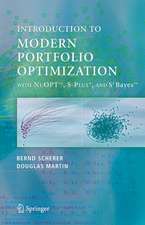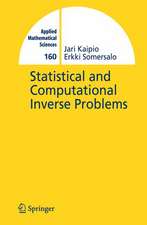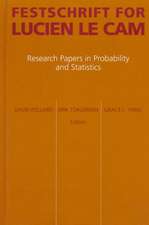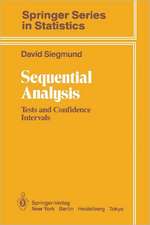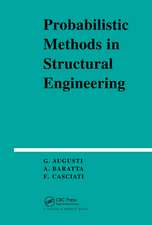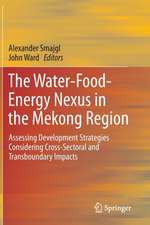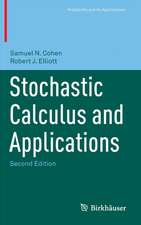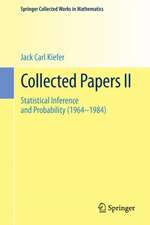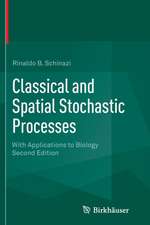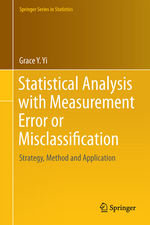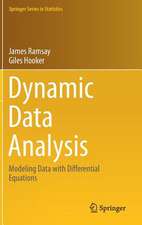Empirical Agent-Based Modelling - Challenges and Solutions: Volume 1, The Characterisation and Parameterisation of Empirical Agent-Based Models
Editat de Alexander Smajgl, Olivier Barreteauen Limba Engleză Hardback – 13 sep 2013
Agent-based modeling (ABM) is a powerful, simulation-modeling technique that has seen a dramatic increase in real-world applications in recent years. In ABM, a system is modeled as a collection of autonomous decision-making entities called “agents.” Each agent individually assesses its situation and makes decisions on the basis of a set of rules. Agents may execute various behaviors appropriate for the system they represent—for example, producing, consuming, or selling. ABM is increasingly used for simulating real-world systems, such as natural resource use, transportation, public health, and conflict. Decision makers increasingly demand support that covers a multitude of indicators that can be effectively addressed using ABM. This is especially the case in situations where human behavior is identified as a critical element. As a result, ABM will only continue its rapid growth.
This is the first volume in a series of books that aims tocontribute to a cultural change in the community of empirical agent-based modelling. This series will bring together representational experiences and solutions in empirical agent-based modelling. Creating a platform to exchange such experiences allows comparison of solutions and facilitates learning in the empirical agent-based modelling community. Ultimately, the community requires such exchange and learning to test approaches and, thereby, to develop a robust set of techniques within the domain of empirical agent-based modelling. Based on robust and defendable methods, agent-based modelling will become a critical tool for research agencies, decision making and decision supporting agencies, and funding agencies. This series will contribute to more robust and defendable empirical agent-based modelling.
| Toate formatele și edițiile | Preț | Express |
|---|---|---|
| Paperback (1) | 638.76 lei 6-8 săpt. | |
| Springer – 23 aug 2016 | 638.76 lei 6-8 săpt. | |
| Hardback (1) | 643.34 lei 6-8 săpt. | |
| Springer – 13 sep 2013 | 643.34 lei 6-8 săpt. |
Preț: 643.34 lei
Preț vechi: 756.86 lei
-15% Nou
Puncte Express: 965
Preț estimativ în valută:
123.10€ • 128.85$ • 102.46£
123.10€ • 128.85$ • 102.46£
Carte tipărită la comandă
Livrare economică 31 martie-14 aprilie
Preluare comenzi: 021 569.72.76
Specificații
ISBN-13: 9781461461333
ISBN-10: 1461461332
Pagini: 225
Ilustrații: XIII, 249 p. 30 illus., 20 illus. in color.
Dimensiuni: 155 x 235 x 23 mm
Greutate: 0.5 kg
Ediția:2014
Editura: Springer
Colecția Springer
Locul publicării:New York, NY, United States
ISBN-10: 1461461332
Pagini: 225
Ilustrații: XIII, 249 p. 30 illus., 20 illus. in color.
Dimensiuni: 155 x 235 x 23 mm
Greutate: 0.5 kg
Ediția:2014
Editura: Springer
Colecția Springer
Locul publicării:New York, NY, United States
Public țintă
Professional/practitionerCuprins
Empiricism and agent-based modelling.- A case study on characterising and parameterising an agent-based integrated model of recreational fishing and coral reef ecosystem dynamics.- An Agent-Based Model of Tourist Movements in New Zealand.- Human–ecosystem interaction in large ensemble model systems.- Using Spatially Explicit Marketing Data to Build Social Simulations
Recenzii
From the reviews:
“This book addresses this challenge by providing a comprehensive framework that helps modellers in the characterisation and parametrisation of agents … . a nice handbook both for newcomers and expert modellers. … it is a progress towards a greater standardisation of the procedures adopted in the model design and parametrisation.” (Giangiacomo Bravo, Journal of Artificial Societies and Social Simulation, Vol. 17 (2), 2014)
“This book addresses this challenge by providing a comprehensive framework that helps modellers in the characterisation and parametrisation of agents … . a nice handbook both for newcomers and expert modellers. … it is a progress towards a greater standardisation of the procedures adopted in the model design and parametrisation.” (Giangiacomo Bravo, Journal of Artificial Societies and Social Simulation, Vol. 17 (2), 2014)
Notă biografică
Alexander Smajgl works at CSIRO Ecosystem Sciences, Australia. Olivier Barreteau is senior water scientist with Cemagref Montpellier.
Textul de pe ultima copertă
This instructional book showcases techniques to parameterise human agents in empirical agent-based models (ABM). In doing so, it provides a timely overview of key ABM methodologies and the most innovative approaches through a variety of empirical applications. It features cutting-edge research from leading academics and practitioners, and will provide a guide for characterising and parameterising human agents in empirical ABM. In order to facilitate learning, this text shares the valuable experiences of other modellers in particular modelling situations. Very little has been published in the area of empirical ABM, and this contributed volume will appeal to graduate-level students and researchers studying simulation modeling in economics, sociology, ecology, and trans-disciplinary studies, such as topics related to sustainability. In a similar vein to the instruction found in a cookbook, this text provides the empirical modeller with a set of 'recipes' ready to be implemented.
Agent-based modeling (ABM) is a powerful, simulation-modeling technique that has seen a dramatic increase in real-world applications in recent years. In ABM, a system is modeled as a collection of autonomous decision-making entities called “agents.” Each agent individually assesses its situation and makes decisions on the basis of a set of rules. Agents may execute various behaviors appropriate for the system they represent—for example, producing, consuming, or selling. ABM is increasingly used for simulating real-world systems, such as natural resource use, transportation, public health, and conflict. Decision makers increasingly demand support that covers a multitude of indicators that can be effectively addressed using ABM. This is especially the case in situations where human behavior is identified as a critical element. As a result, ABM will only continue its rapid growth.
This is the first volume in a series of books that aims tocontribute to a cultural change in the community of empirical agent-based modelling. This series will bring together representational experiences and solutions in empirical agent-based modelling. Creating a platform to exchange such experiences allows comparison of solutions and facilitates learning in the empirical agent-based modelling community. Ultimately, the community requires such exchange and learning to test approaches and, thereby, to develop a robust set of techniques within the domain of empirical agent-based modelling. Based on robust and defendable methods, agent-based modelling will become a critical tool for research agencies, decision making and decision supporting agencies, and funding agencies. This series will contribute to more robust and defendable empirical agent-based modelling.
Agent-based modeling (ABM) is a powerful, simulation-modeling technique that has seen a dramatic increase in real-world applications in recent years. In ABM, a system is modeled as a collection of autonomous decision-making entities called “agents.” Each agent individually assesses its situation and makes decisions on the basis of a set of rules. Agents may execute various behaviors appropriate for the system they represent—for example, producing, consuming, or selling. ABM is increasingly used for simulating real-world systems, such as natural resource use, transportation, public health, and conflict. Decision makers increasingly demand support that covers a multitude of indicators that can be effectively addressed using ABM. This is especially the case in situations where human behavior is identified as a critical element. As a result, ABM will only continue its rapid growth.
This is the first volume in a series of books that aims tocontribute to a cultural change in the community of empirical agent-based modelling. This series will bring together representational experiences and solutions in empirical agent-based modelling. Creating a platform to exchange such experiences allows comparison of solutions and facilitates learning in the empirical agent-based modelling community. Ultimately, the community requires such exchange and learning to test approaches and, thereby, to develop a robust set of techniques within the domain of empirical agent-based modelling. Based on robust and defendable methods, agent-based modelling will become a critical tool for research agencies, decision making and decision supporting agencies, and funding agencies. This series will contribute to more robust and defendable empirical agent-based modelling.
Caracteristici
First comprehensive guidebook for the parameterisation and characterisation of empirical agent-based modelling This book distinguishes specific modelling situations and provides for each situation a clear sequence of steps Includes contributions from such well-known academics and ABM experts as Andreas Ernst, Marco Janssen, and Armando Geller Includes supplementary material: sn.pub/extras

